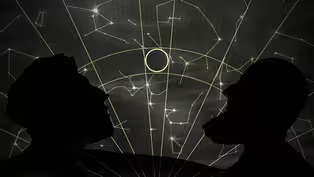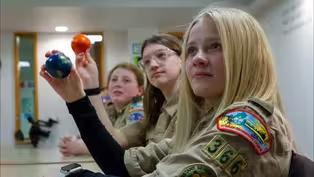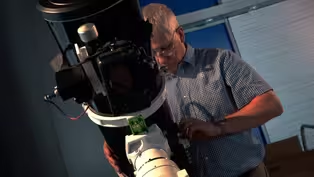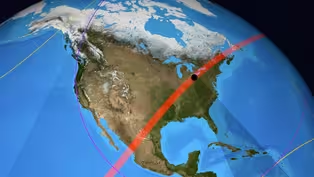Special Programs
Eclipse Mythology
Clip: Episode 20 | 5m 1sVideo has Closed Captions
CMU Professor, Dr. Ari Berk, describes how different cultures interpret eclipses.
Central Michigan University Professor, Dr. Ari Berk, describes how different cultures interpret eclipses.
Problems playing video? | Closed Captioning Feedback
Problems playing video? | Closed Captioning Feedback
Special Programs is a local public television program presented by WCMU
Special Programs
Eclipse Mythology
Clip: Episode 20 | 5m 1sVideo has Closed Captions
Central Michigan University Professor, Dr. Ari Berk, describes how different cultures interpret eclipses.
Problems playing video? | Closed Captioning Feedback
How to Watch Special Programs
Special Programs is available to stream on pbs.org and the free PBS App, available on iPhone, Apple TV, Android TV, Android smartphones, Amazon Fire TV, Amazon Fire Tablet, Roku, Samsung Smart TV, and Vizio.
Providing Support for PBS.org
Learn Moreabout PBS online sponsorship- My expertise lies in the stories that people tell and have always told about their culture and the worlds around them.
The way that any culture or tribe or group of people tells stories about their environment, it provides enormous insight into really what it is to be human.
Obviously, there's a lot of similarities that cultures share, but the differences I think, are really crucial.
Every culture has their own particular responses to events like the eclipse.
Everyone is watching the skies and deriving meaning from that.
Right now in our contemporary world, we have primarily a scientific language that allows us to understand what's happening in these events that we're viewing.
Well, people of the past were no different.
They looked up to the heavens, they had questions about what was happening, and they came up with their own culturally relevant answers.
So I think when we look at those beliefs of the past or of contemporary indigenous people about things like eclipses, whether they're solar or lunar, again, they tell us a lot about what it means to be human and to have questions about the natural world around us.
Lots of cultures viewed a solar eclipse with a fair amount of trepidation.
The Maya, for example, of Central America, viewed it as the moon has become angry and takes a bite out of the sun.
In fact, their word for it is Chi'bal K'iin, which means the sun gets bitten.
There are in Benin and Togo in West Africa, there's a fascinating, and I think really relevant belief about eclipses.
It's not a psych, a scientific viewpoint, but it's a psychological interpretation.
The idea is that people argue with each other.
Men, women, children, everyone.
We get into things, we argue, but sometimes those arguments become too much.
And at that time, the people of Togo and Benin believed that the sun and the moon, hearing all of this argumentation constantly from people over the Earth would begin to argue themselves.
So when there was a solar eclipse, it was believed to have been brought about by these arguments between the sun and the moon.
And the moon would then move in a certain way and the sun would darken.
But then, this is, I think the most fascinating part and what makes these beliefs really relevant.
It was then in incumbent upon people here on the Earth to settle their disputes.
So among these people in West Africa at the time of a solar eclipse, they would begin to open up dialogues of conversation, of peacemaking, of settling old debts, settling old arguments.
So again, it's not so much a scientific explanation, but it's one that provides an important function in that society.
I suspect that even ancient people understood that there was a metaphorical power in this also, that it was a moment when darkness had the ascendancy for a moment.
That the sun, which is the source of life for every human being in the world, is being overtaken by a shadow for a moment.
Now that is what's happening.
And that's also, I think what these kind of, the monsters, the wolves, the dragons are seen to be doing.
But more than that, it's about telling a story that people can participate in.
A dragon, a celestial dragon is eating the sun.
Now, you as a human being, it is your job to frighten that dragon away.
So get out there, you get the drums out, the pots and pans, the sticks, the flutes, the rattles.
And it's your job to participate in that event.
So it's an event that not only confirms a culture's understanding of their cosmos, their view of the cosmos, but also confirms their place in it.
We are connected to that.
And then when we have events like eclipses, those relationships become very important for a small moment in time.
Remind us of those connections with those beings.
Even if you can't get out, if you can't see it or experience it in totality, you can still experience it by knowing that it's happened.
And by knowing that for thousands and thousands of years, your ancestors and the ancestors of your neighbors and your fellow human beings have stopped for a moment and had a real human experience.
Whether it was based in fear or hope, it doesn't really matter at the end of the day, they have paused to say something wondrous is happening, and it then becomes your own individual personal job to determine what kind of meaning that's gonna have for you.
So if I could, if I were king of the universe, I would say, take a moment and think about it.
What does the eclipse mean for you?
What has it meant for others?
Where's your place in the long standing tradition of looking up to the sky at the time of an eclipse or another celestial event and wondering what is happening and why is this wonderful to me?
Video has Closed Captions
Clip: Ep20 | 5m 23s | Scientists use eclipses for discovery and to prove their theories. (5m 23s)
Eclipse Preparation with Scout Troop 366G
Video has Closed Captions
Clip: Ep20 | 3m 59s | In Saginaw, Scout Troop 366G prepares to view the eclipse. (3m 59s)
Video has Closed Captions
Clip: Ep20 | 3m 3s | CMU Professor, Dr. Axel Mellinger, shares his passion for astrophotography. (3m 3s)
Video has Closed Captions
Clip: Ep20 | 7m 58s | CMU Professor, Dr. Aaron LaCluyze, describes viewing a total eclipse. (7m 58s)
Providing Support for PBS.org
Learn Moreabout PBS online sponsorshipSupport for PBS provided by:
Special Programs is a local public television program presented by WCMU



















